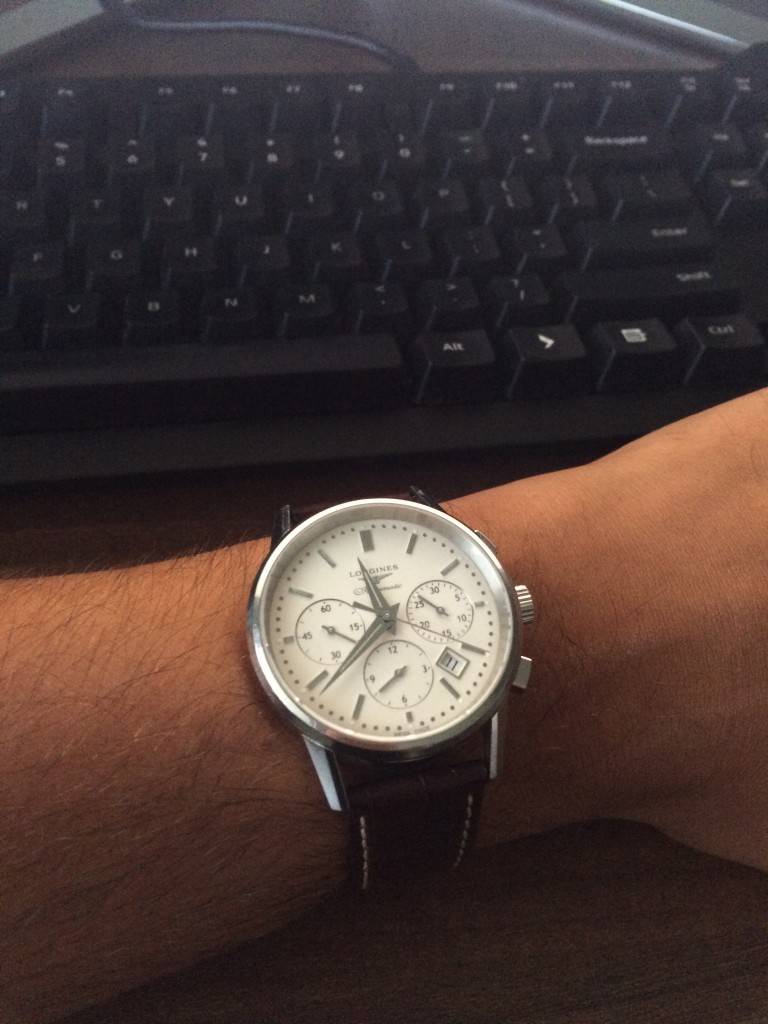On watches
The CEO Of TAG Heuer said that he’s “pleased about the Apple Watch“, because “Apple will get young people used to wearing a watch and later maybe they will want to buy themselves a real watch.“
Aside from the locker room rhetoric (seriously, is that guy twelve?) that history will make him eat in shame, the statement might be true enough in principle, but I am not sure how it relates to TAG Heuer, which is to Swiss watchmaking what Dacia is to automobiles.
Does the job, but not exactly high end. And unlike Dacia, super expensive for what it is.
(Fine point for those who might feel compelled to point it out in the comments: Heuer was a fine enough maker before the acquisition by TAG. The result isn’t.)
And young customers switching from cool modern gadgets to age of steam legacy technology is a funny idea. Are you imagining the teenager who goes from tweeting from his wrist to having to manually wind up a fragile mechanical contraption that costs several salaries and does literally nothing his two smartphones don’t already? Yeah, me neither.
It’s far more likely that the young people of today will simply decide that smartwatches are fine to wear with suits a few years from now, and that will be that for the traditional timepiece. Look, let’s face it – the wristwatch is a piece of 19th century technology that literally nobody apart from divers and astronauts excusably needs in the 21st. It’s frivolous spending par excellence that besuited cocks use to impress each other and feel like James Bond.
Watches are luxury items and status symbols, and most importantly, the only piece of jewelry acceptable on a grown man (besides the optional wedding ring), which is why they survived the advent of the smartphone at all. But fundamentally, wearing a mechanical watch is like driving a horse-drawn carriage. It’s a needlessly complicated and frivolously expensive way to do something that three other devices in your pockets are already doing at no extra cost, and newer specialized devices do better at the price of a hotdog. But keeping time is not really the point.
Now, can you guess what happens in all-but-the-highest-end-markets when similarly priced substitutes with vastly more functionality appear? Do you know what happened to horses in the early 20th century? Hint: there was a lot of glue.
The Vacheron Constantins, Patek Philippes and Blancpains of the world do not need to worry, much like the Arab horses and Lipizzaners of the world didn’t need to worry a century ago. However, like the draft horses of the day, the TAG Heuers and Hublots and Montblancs are fucked, unless they dramatically reposition themselves.
Which brings us to the smartwatch.
On smart watches
Smart watches, like artificially intelligent personal assistants and 3D printing, are one of those amazingly promising technologies that are clearly the future and currently suck monumental ass.
The adoption progress will be interesting to watch (pun not intended), because the fate of the smartwatch (and the survival of the traditional watch) as a product category in the short term depends on whether early adopters in London, Zurich and New York agree it is an acceptable substitute for the traditional automatic watch, to wear with a suit without looking like a teenager. As I said a minute ago, that will happen at the very latest when today’s teenagers enter the workforce and change the culture. Probably sooner, because bankers love their gadgets, and those tactile taps you can send to other users’ wrists can be used for all sorts of insider trading stealth communication shenanigans.
But the smartwatches of today are still equivalents of 1990s mobile phones. The idea is there, but the implementation is rudimentary. What’s needed is a smartwatch that acts like an effective control center for much of your data, scheduling and communications, controls your house from afar, keeps detailed track of your health (at the level of blood chemistry, if not genetics), houses an artificial intelligence virtual assistant and can stay on for longer than a few hours. This is amazing and it will happen.
But you can probably see there are a few technologies there we have yet to figure out, not least of which is the relatively strong AI needed to make virtual assistants at least modestly useful.
I used Siri a grand total of four or five times in the past year, partly because it struggles with my accent, which is admittedly somewhere between Queen’s English and a Bond villain, and partly because I can do anything it can do faster and without having to repeat myself three times. It doesn’t help that the business lookup function for restaurants and such doesn’t work in my country.
The concept of a personal butler in the cloud is amazing and it will be a big part of the future, but what we have now is nowhere near that.
Electronic familiar spirits roaming about the manmade ether doing our bidding, and genuinely smart watches that function as complete logistical support and command center for life and notify us when we might require our next perfectly customized meal to keep us alive and healthy into our 180s are the future, but not yet the present.
The idea is there. The technology needs a few breakthroughs.
Apple came closer than anybody else to date, but has yet to cross the critical threshold. Which brings us to…
Apple
Apple wasn’t the first company to make a smart watch. It is just the first one to probably do it properly eventually, with the second or third generation or so. Because right now, the Apple Watch kind of sucks.
In fact, it was the first new category of Apple product in five years that I didn’t immediately buy (yeah yeah, fanboy sheeple and all that, because I enjoy products that actually work most of the time). A lot of people, at least everybody I know who uses Apple products, seem to be waiting for a second generation, hoping for improved battery life, sleeker design and a point to the damn thing.
It used to be that Apple wowed on first try, and now the question is whether they can any more.
After Jobs, Apple is worryingly short on radical innovation and long on morphing into a luxury brand whose core business is increasingly parting RAVs with their criminally acquired money by means of Hermés wristbands and gold-cased versions of existing products.
Basically Apple switched from doing this
to doing this
Also note the oxymoron in the name of the website it comes from.
Did I mention with sufficient vehemency that Tim Cook can suck my dick?
Sure, the strategy of selling bling to third world mobsters (i)pads the balance sheet now, but it just isn’t sustainable and amounts to a renegation of Apple’s historical competitive advantage.
There is that huge cadre of nouveau riche emerging market Bond villains ostentation-conscious customers with more money than taste to sell to, and a rational company will. But it’s not what a tech company whose greatness was built on profound innovation should be replacing that innovation with.
And before anybody objects that Apple was always a luxury brand, let me make an important point. Apple was always expensive, but you paid for getting the future five years early. Now the hope is enough Chinese functionaries will be duped into paying for golden penis extensions. There’s a big difference between selling expensive cutting-edge technology, where the price is for functionality and user experience, and selling average technology in $ 17.000 gold cases. It’s fine for peacocking in a Moscow disco, but wear it anyplace where grownups do serious business and you’ll get laughed out. (Usual rule of gold watches applies: women can, men can’t, unless they’re mobsters, hiphoppers or seventy.)
A lot of cash is flowing in, but they don’t know what to do with it. The dividend is pathetic, R&D isn’t exactly turning any heads lately, q.e.d, and no effort has been made to perhaps repatriate critical parts of manufacturing and, for starters, standardize screen quality on laptops (so each new Mac isn’t a lottery) and fix the bloody charger cables that spontaneously disintegrate and shock people and start fires. I get that it’s 60 dollars a year for a new charger from every Mac user on the planet, but seriously, Cupertino, what the fuck.
Imagine how Steve Jobs, with his obsession with spartan simplicity and functional minimalism, would react to a golden iPhone. Or chargers that don’t last a year.
In fact, the sort of radical innovation that made Apple great now seems to happen mostly at Google.
The dearth of innovation is a huge problem for Apple, because it’s only a matter of time before somebody makes a better phone and more integrated platform and Apple goes the way of other once apparently invulnerable tech giants that missed the starting gun. And since it stopped being a nimble shark and became a fat lazy whale, it is fair game for a new generation of hungry sharks. So it goes in tech. (I know sharks don’t eat whales. It’s a figure of speech. Just roll with it.)
It doesn’t even have to be a shark. A marginally fitter whale will do. If I were a Microsoft or Google, I’d smell blood in the water by now and giggle happily to myself.
I don’t see Apple going out of business, but that trillion dollar valuation might be a touch too optimistic.
The switch from radical innovator to luxury brand is worrying, and unless it is a temporary funk, the company is fucked in the long run. It tells me that Apple can’t keep doing its thing without Steve Jobs,
It also shows what happens to a company when nobody yells at the engineers anymore, and the marketing hipsters, designers, linguistic wizards and PRists move from a supplementary to a central role.
Of course Apple always made extensive use of these things – to give an extra edge to revolutionary products. Without them, the marketing spiel won’t work for long.
The marketing side remained, but the heart of what the company was built on seems to have slipped away.
Now, if they diversify into self-driving cars, that might be a different story altogether.



